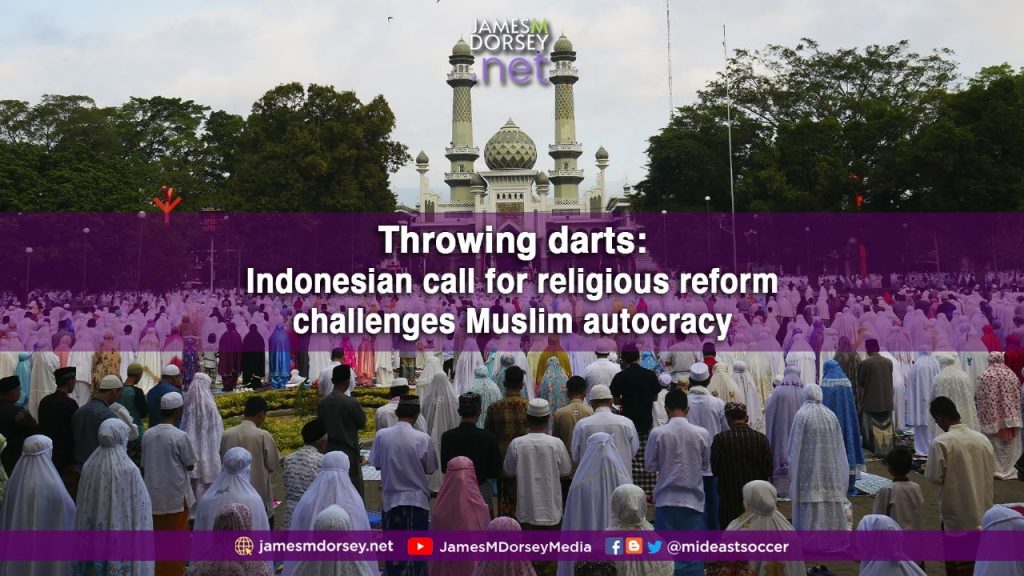At first glance, Islamic scholars discussing the religious legitimacy of the United Nations and the nation-state sounds esoteric. It’s not. On the contrary, it’s potentially revolutionary.
Religious scholars, led by Nahdlatul Ulama, the world’s largest and arguably most moderate Muslim civil society movement in the world’s largest Muslim-majority country and democracy, hope that the legitimization will counter notions of a caliphate and a transnational Islamic state as an alternative world order as advocated by militants such as Al Qaeda and the Islamic State.
If adopted, legitimization of the United Nations would make the UN charter with its references to “fundamental human rights…the dignity and worth of the human person, (and)…the equal rights of men and women” legally binding for its Muslim signatories, according to religious law. In doing so, the religious legitimization would take substantial wind out of the sails of often whipped-up anti-Muslim sentiment that questions Muslim attitudes and loyalty towards the state.
That sentiment was, for example, evident when an anchor on India’s controversial Hindu nationalist, Hindi-language Zee news recently asked whether “Muslims who sing the national anthem become kafirs.” The anchor was using the Arabic word for an infidel.
The effort to reform Islamic jurisprudence so that it embraces the concept of the nation-state, and the United Nations, is part of a sustained Nahdlatul Ulama effort to spark reform of Islamic jurisprudence and inspire other faiths to take a critical look at their potentially problematic tenants as a way of countering extremism and religiously inspired violence. That’s where the revolutionary aspect kicks in.
Reform of Islamic jurisprudence challenges a key pillar of autocratic strategies in the Muslim world designed to ensure the survival of repressive regimes. Muslim leaders, parroted by their Western counterparts, have for more than two decades since 9/11 insisted that Islam and Islamic jurisprudence need no reform. Instead, they assert that jihadis misrepresent and misconstrue the faith. In doing so, autocrats drown out criticism of their brutal, repressive rule that brooks no dissent and potentially provokes violence.
Casting jihadists as deviants rather than products of problematic tenants of jurisprudence that justify violence stymies criticism of the justification of autocracy as a necessary means to combat violence and promote moderate Islam. Even so, that may not be a popularly shared approach. In a poll, 56 per cent of Saudis surveyed said the government was not “paying attention to the opinions of ordinary citizens like me.”
Timed to coincide with the centennial of Nahdlatul Ulama according to the Muslim Hijri calendar, the scholars will gather in February in the Indonesian city of Surabaya under the auspices of the recently constituted Religion Forum 20, a Group of 20 engagement tack, to discuss an “Islamic jurisprudence for a global civilization.” The Group of 20 brings together the world’s largest economies.
Nahdlatul Ulama’s concept note for the Surabaya conference argues that “views that legitimize and encourage suspicion, segregation, discrimination, and even hostility and conflict towards those who bear the legal status of “infidels…are scattered throughout classical texts on Islamic jurisprudence (fiqh). These views…are still considered…credible…and should…be practiced to the present day. Muslim groups involved in conflict – including the use of violence and terror – defend their position by citing references from these classical fiqh texts.”
The concept note was bolstered by a Nahdlatul Ulama religious finding in 2019 that eliminated the category of the kafir or in Islamic law. Potentially, it will put on the spot some of the invited speakers, such as Muslim World League General Secretary Muhammad al-Issa, Forum for Promoting Peace in Muslim Societies President Abdallah bin Bayyah, Tabah Foundation head Habib al-Jufri, and Ahmad Al Tayyeb the Grand Iman of Al Azhar, the Muslim world’s foremost seat of Islamic learning. These men represent autocratic regimes that insist that Islamic jurisprudence needs no reform.
Al-Issa’s League is Saudi Crown Prince Mohammed bin Salman’s vehicle for propagating a socially liberal, politically repressive interpretation of Islam that demands absolute obedience to the ruler. Bin Bayyah and Al-Jufri serve the same purpose for United Arab Emirates President Mohammed bin Zayed. Al-Tayyeb’s Al Azhar is subservient to the government of Egyptian President Abdul Fattah al-Sisi and supported by the two Gulf monarchies.
Religious legitimization of the United Nations and the concept of a nation-state could have far-reaching consequences for the order of the Muslim world that partially bases its religious justification on the employment by the Organisation for Islamic Cooperation (OIC) of the language of Islamic jurisprudence to empower states. The OIC groups the world’s 57 Muslim-majority countries.
By reforming the jurisprudence, Nahdlatul Ulama would, in theory, introduce guardrails for the incorporation by OIC members of Islamic law into domestic legal systems. By and large, Muslim-majority states have used the OIC framework to monopolise the right to interpret Islamic law and bend it to their will, for example, in the justification of abuse of human rights or, in the case of countries like Saudi Arabia and the UAE, to demand absolute obedience of the ruler.
The OIC and some of its members have also used the organisation’s religious framing and 1990 Cairo Declaration on Human Rights in Islam to lobby the United Nations to classify blasphemy as a violation of human rights and a form of hate speech.
Liberal critics charge that Nahdlatul Ulama’s silence about a recently adopted new Indonesian criminal code has cast a shadow over its credibility. The law defines apostasy as leaving a religion or belief and criminalises anyone who attempts to persuade a person to be a non-believer in a religion or belief. It also bans extramarital sex and curbs freedom of expression by, for example, outlawing insulting the president, but puts major limitations on who can file a complaint.
Nahadlatul Ulama’s acquiescence sparked questions on how it squares that with its unconditional endorsement of the Universal Declaration of Human Rights – a significant differentiator in its rivalry with state-sponsored autocratic versions of moderate Islam. Privately, influential Nahdlatul Ulama sources defend the socially restrictive aspects of the law but concede that freedom of expression concerns are legitimate.
Even so, scholars Sana Jaffrey and Eve Warburton warned that provisions of the law “threaten political dissent with prison sentences and have the potential to muzzle public debate about the purview of the state in citizens’ private and political lives.”
The criticism notwithstanding, Nahdlatul Ulama’s effort to anchor the United Nations and the concept of the nation-state in Islamic jurisprudence constitutes the most serious current challenge to autocratic Muslim justification of repressive rule. In doing so, it could prove to be revolutionary. (IPA Service)
By arrangement with the Arabian Post

 Komera Anka Rao Is Consistently Clearing Wastes Of The Forests To Keep It Clean
Komera Anka Rao Is Consistently Clearing Wastes Of The Forests To Keep It Clean 